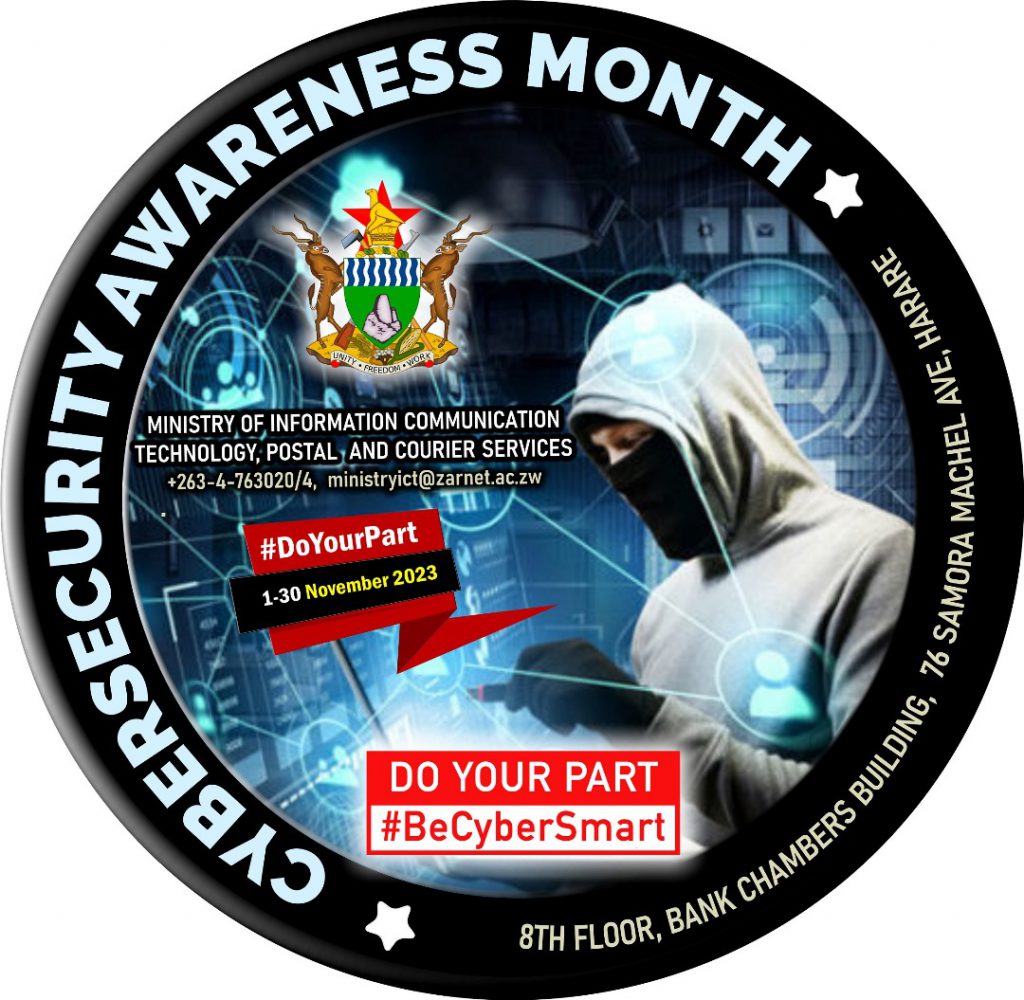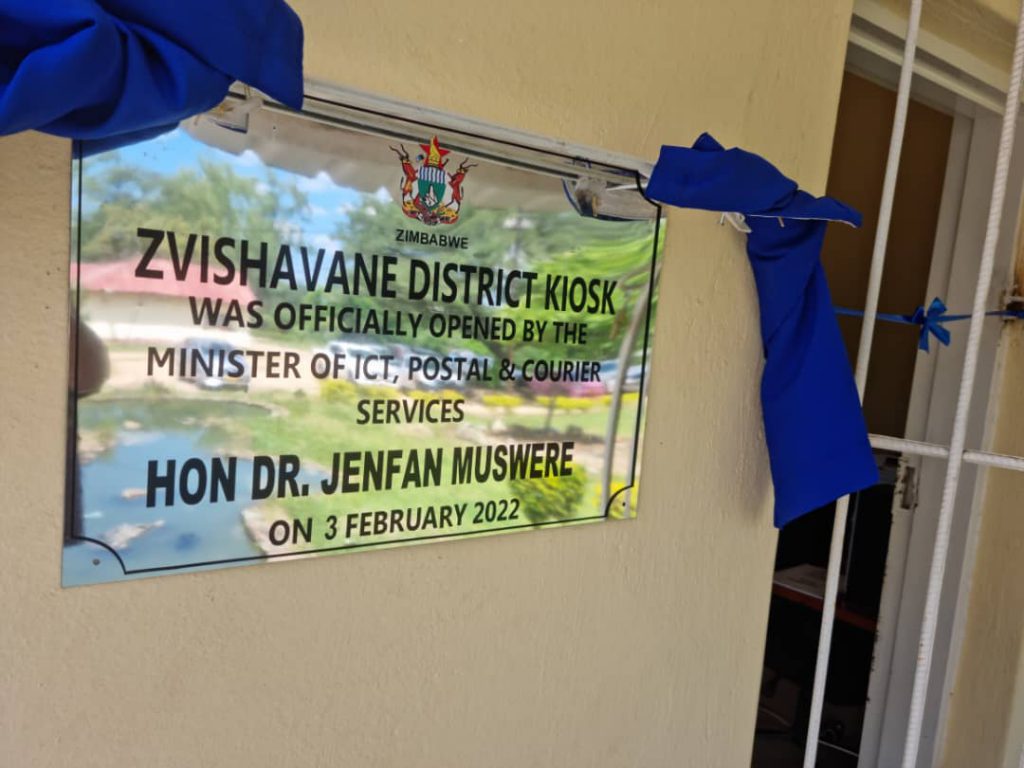About Us

Lorem ipsum dolor sit amet, consectetur adipiscing elit. Ut elit tellus, luctus nec ullamcorper mattis, pulvinar dapibus leo.
Zimbabwe, like many other countries globally, is fully aware of the importance of Information Communication Technologies for Socio-economic development and transformation. It is acknowledged that those countries from both the developed and developing world who recognized the potential of information communication technologies (ICTs) and went on to develop relevant policies and implement strategies, as well as invested in ICTs have realized immense benefits for their economies and their people. Zimbabwe has great potential and leveraging on its high literacy level, robust infrastructure base (communication, energy and road networks), geographical location and favourable climatic conditions, can leapfrog and surpass the developments made by some countries, particularly in Africa.
The Government of the Republic of Zimbabwe is highly committed to streamlining ICTs because they are cross-cutting and enablers across all sectors of the society and economy. Admittedly, there are some challenges that must be overcome and these include inadequate infrastructure (communications and electricity), cost of access to ICT devices, internet costs and interoperability challenges among others. In this new era of advanced ICTs technological developments characterized by the fourth Industrial Revolution and the fifth-generation technologies where all things use sensors, are connected and intelligent, countries which do not embrace these technologies will lag behind and most likely be dominated over by those who will have invested in new technologies.
To systematically exploit the potential of ICTs for national development and transformation, Zimbabwe needs to develop an all-inclusive guideline that clearly articulates how the country will develop, deploy and manage ICTs across all sectors. Thus, the Ministry has produced this Strategic Plan that will work in alignment with other Policy and legislative promulgations to guide the ICTs sector in the next five years. The crafting of the Strategic Plan 2021-2025 and the implementation roadmap draws inspiration from the National Vision 2030, “Towards a prosperous and empowered Upper‑Middle Income society by 2030”,
The Strategic Plan together with other policy documents like National Development Strategy 1 (NDS1) and Smart Zimbabwe 2030 Master Plan will focus on key specific sector-focused integrated Pillars such as Smart Solutions which include among many others, Smart Government, Smart Cities, Smart Agriculture, Smart Education, Smart Transport, Smart Health, Smart Tourism, and Smart Mining. These Pillars are anchored on a strong foundation of the following common Platforms:
- Policy, Regulation and Standards;
- Secure and Shared Infrastructure;
- Partnerships, Skills, Capacity Building and Content Development;
- Security of networks and services.
Coordination of the adoption, development and deployment of ICTs driven solutions and applications should be managed under the guidance of the Ministry of Information Communications Technology Postal and Courier Services. This will avoid duplication of functions, resources allocations and mandates, so as to ensure optimal utilization of financial and human resources across Government MDAs. As the country moves towards becoming an Upper middle-income society by 2030, we need to adopt a completely new approach and exploit the potential of ICTs by developing appropriate and cost-effective applications that can improve the country’s productivity and competitiveness to move towards a knowledge-based and fully inclusive Smart Society by year 2030.
The Ministry of Information Communication Technologies, Postal and Courier Services presents here a comprehensive, focused, forward thinking approach on how Zimbabwe can exploit the potential of ICTs for socio-economic development and transformation and becomes the focal point for all ICT projects and programs in Zimbabwe.
Having realized the importance of ICTs and their potential to transform the country into a knowledge-based, smart and digitally inclusive society, the Ministry of Information Communication Technology, Postal and Courier Services has crafted a Strategic Plan 2021-2023 which is to define the course of ICTs in Zimbabwe in the coming years, against the backdrop that the technologies become an integral and critical determinant in redefining national development in all the sectors of the economy. This implementation roadmap draws inspiration from the National Vision 2030, “Towards a prosperous and empowered Upper‑Middle Income society by 2030”, the National Development Strategy (NDS1) (2021 – 2025) and the Smart Zimbabwe 2030 Master Plan.
Digital technologies have become the cornerstone and key enabler for Government, businesses and citizens. Radical developments in the digital arena present immense possibilities in all areas of human activity. The digital transformation addressed in this strategic plan endeavours to successfully implement various programmes and projects to empower citizens with new capabilities to sustainably exploit ICTs for improved quality of life in Zimbabwe.
The transformative effect of digital platforms, products and services transcends beyond the ICT sector. The national aspiration for a digital economy is to leave no one behind through the roll-out of inclusive ICT programmes and projects that spur economic growth. Consequently, this strategic plan was developed with a view to strengthen the foundation for a knowledge‑based society anchored on ICTs. The anticipated benefits from digital enterprise makes it a dream worth pursuing to transform the nation into a digital economy and a self-sustaining economic powerhouse in Africa and beyond.
The crafting of this Strategic Plan gives the impetus to work together in Public Private Partnerships in the pursuance of the prioritised programs, projects and targets to focus on realisation of the National Vision 2030, while delivering on the given mandate as a Ministry.
Ministry's Functions

- Develop an enabling environment for the creation of a knowledge-based society that transcends across all levels of society;
- Co-ordinate all ICT matters in Government, for example, infrastructure, applications development and ICT policy formulation;
- Develop appropriate policies and strategies that enhance the provision of ICT, telecommunication, postal and courier services;
- Spearhead the development of appropriate regulatory frameworks that facilitate the promotion of information communication technology, telecommunications, postal and courier services;
- Champion and promote ICT literacy and utilization in the country in order to enhance regional and international competitiveness as a nation;
- Develop supportive and enabling infrastructure (for example, information kiosks and community information centres) to ensure equitable access to ICTs by all citizens including disadvantaged/marginalized groups and rural communities;
- Support MDAs with the skill and knowledge to maintain websites;
- Evaluate the impact of ICT, telecommunications, postal and courier services across all sectors of the economy;
- Champion, promote and coordinate national ICT, telecommunications, postal and courier services research and development of cost-effective software, hardware and infrastructure so that it reaches best international standards;
- Develop supportive and enabling communications infrastructure to ensure equitable access to ICTs by all citizens including disadvantaged groups and rural communities;
- Introduce and enforce international best practice quality service standards in the provision of ICTs;
- Create a conducive environment for investment in the areas of ICTs, telecommunications, postal and courier services through public private partnerships;
- Manage parastatals and state-owned enterprises under the Ministry;
- Promote innovation in the ICT sector so as to spur growth of the ICT industry;
- Create and manage national e-waste management policies, strategies and processes that ensure proper disposal of obsolete ICT devices; and
- Co-ordinate the development, implementation, promotion and monitoring of anti-dumping laws, processes and practices to ensure that obsolete and near obsolete ICT equipment are not imported into the country.

Departments and their functions
- Develop, manage and maintain central government ICT infrastructure, for example, PFMS Network;
- Develop supportive and enabling communications infrastructure to ensure equitable access to ICTs by all citizens including disadvantaged groups and rural communities;
- Develop ICT access channels, for example, information kiosks and community information centres for the less privileged members of society to have access to developmental information;
- Support research, development and manufacture of ICT products and services;
- Establish linkages with ICT research institutions nationally, regionally and internationally;
- Create a conducive environment for investment in the areas of ICTs, telecommunications, postal and courier services through public private partnerships;
- Establish and manage ICT National Infrastructure framework, structures, systems and services at all levels;
- Facilitate the establishment of a vibrant ICT sector in the country.
- Coordinate, advise, monitor and provide technical support services on all ICT activities in government, that is, systems requirements analysis, evaluation of tenders, ICT acceptance testing, contract negotiations, project management and implementation;
- Provide a central computer processing facility to government ministries and departments;
- Spearhead the Iimplementation of the Presidential e-Learning programme in schools;
- Develop and maintain ICT standards to guide the use of ICTs;
- Develop and maintain software systems for government and ensure strict adherence to ICT security requirements;
- ICT capacity building for Civil Servants and Citizens;
- Conduct research and advise government on technological developments relating to ICTs to enhance service quality.
- Spearhead the review and alignment of the strategic purpose of the Ministry with national development imperatives and Vision 2030;
- Oversee the preparation of the Ministry’s Strategic Plan in consultation with other Departmental Heads and the Secretary;
- Monitor the implementation of the Ministry’s Strategic Plan by the various Departments and evaluate support that may be required;
- Spearhead the evaluation of the Ministry projects and programmes;
- Provide high quality expert advice to the Secretary to enable strategic thinking and optimise strategic planning processes for the Ministry;
- Develop strategic tools for use by the Ministry in strategic thinking, planning and implementation;
- Superintend over the development of aligned and integrated Department plans;
- Oversee the conduct of reviews to identify strengths and weaknesses and evaluate operations effectiveness within the Ministry;
- Superintend over the development of an appropriated monitoring and evaluation (M&E) system in the Ministry;
- Coordinate the production of Monitoring and Evaluation reports and make presentations based on findings;
- Coordinate international activities related to planning and policy development;
- Design and manage the programmes that support the Ministry’s strategic purpose and intents;
- Conduct market research, provide current data on changes taking place in the environment with specific attention to the economic, political and technological trends in the environment;
- Coordinate the establishment and implementation of an effective monitoring and evaluation system for the Ministry.
- Formulate, evaluate and review policies, regulations and guidelines for the security of Information Communication Technology (ICT)systems, networks and related infrastructure;
- Manage the design, installation, configuration and upgrading of information communication technology security systems for Line Ministries and Departments;
- Ensure the security of Information Communication Technology systems, networks and infrastructure by coordinating the implementation of security standards procedures and internet protocol security measures;
- Contribute to Information Communication Technology disaster recovery for line ministries and government departments by ensuring the integrity of the Information Communication Technology back-up systems;
- Monitor in collaboration with other security services, Cyber Security threats and respond to incidents that threaten the ICT systems which compromise social and economic interests;
- Conduct periodic awareness and training on information security policies, standards and procedures;
- Foster co-operation between the public and private sectors in safeguarding the national critical infrastructure;
- Establish international linkages with other regional and international bodies on information security, for example the SADC regional Computer Incidence Response Team;
- Participate in the development of the budgets, and funding strategies for Information Communication Technology security systems and facilities;
- Liaise with sub-contractors, service providers, client Ministries, Government Departments and other stakeholders on Information Communication Technology risk management measures;
- Prepare for the Department’s participation in National and international fora on Information Communication Technology security administration;
- Facilitate the provision of technical input in the construction and procurement of equipment, services and materials for National Information Communication Technology
- Preparation of the Ministry budget;
- Execution and monitoring the budget;
- Production of Ministry’s financial statements and returns;
- Management of assets and property;
- Provision for Administration Services;
- Implementation of Public Service Human Resources policies and regulations;
- Human capital acquisition and development;
- Coordinating implementation of Performance Management Systems;
- Manage Employee relations – Grievance and Disciplinary Procedures;
- Records and Information Management.
- Develop ICT policies, strategies and work plans;
- Develop and periodically review ICT legislation and regulatory instruments;
- Advise and represent the Ministry on legal matters.
- Coordinate the formulation, implementation and evaluation of gender mainstreaming, inclusivity and wellness policies, strategies and programmes in the Ministry in consultation with Heads of Departments and make recommendations to the Permanent Secretary;
- Provision of technical expertise and advice on capacity building, knowledge building and management of gender mainstreaming, inclusivity and wellness issues;
- Lead in the review of workplace policies and procedures in the Ministry, ensuring that these are all inclusive;
- Develop and maintain strategic partnerships with stakeholders such as the Zimbabwe Gender Commission, other Line Ministries and Civil Society organizations to entrench gender mainstreaming, inclusivity and wellness issues in the Ministry and ensure that they feed into the national agenda;
- Coordinate the implementation of policies and programmes on the welfare of persons with disabilities in the Ministry;
- Advocate for the implementation and institutionalization of gender, inclusivity and wellness policies, strategies and programmes and ensure communication and advocacy to all Members within the Ministry;
- Ensure that public utilities in the Ministry are accessible and do not discriminate against persons with disabilities;
- Develop and manage capacity development programmes to enhance Members in the Ministry’s understanding of gender mainstreaming, inclusivity and wellness issues;
- Identify internal / external trends and recognize best practices which increase diversity among the workforce in the Ministry;
- Design, implement and monitor all-inclusive programmes intended to improve the physical and mental health of employees in the Ministry;
- Audit Ministry policies, procedures and systems to ensure that the working environment upholds employee wellbeing as a culture and develop appropriate wellness programmes;
- Ensure that all activities, plans and programmes in the Ministry are inclusive and gender mainstreamed all times.
- Procure, plan and prepare bidding documents;
- Manage bids evaluations;
Prepare contract documents and participate in contract negotiations
- Monitoring the financial administration and accounting procedures;
- Evaluation of the cost effectiveness of any project undertaken by the Ministry;
- Recommendation of internal control systems.
Main Pillars of the Digital Economy
Digital technologies have become the cornerstone and key enabler for Government operations, businesses and individuals. Radical developments in the digital arena present immense possibilities as innovations in technology continue to prevail in all areas of human activity. The digital transformation roadmap requires Government, organizations and individuals to adapt to this new reality, which this strategic plan endeavours to address. It is anticipated that the successful implementation of the various programmes and projects highlighted therein will lay the foundation needed for empowering citizens with new capabilities to sustainably exploit ICTs for improved quality of life.
The First National Development Strategy (NDS1) entrenches ICTs, as key enablers for economic development, across all National Development Strategies so that universal access is attained by 2030. This is in line with UN’s 2030 Sustainable Development Agenda (SDGs), which refers to attainment of a digital economy by 2030 whose main pillars are illustrated below.
Human Capital Development
Upstream: Primary, Secondary, Teachers and Vocational Training
Knowledge creation: Colleges and Universities Training
Knowledge Commercialisation: Engineers, Scientists, Researchers, Entrepreneurs and Skilled Professionals.
Digital Infrastructure
- GSM Network
- Optic fibre networks
- Internet coverage
- Data storage capacity
- Digital Public Service delivery
- Industrial Automation
Enabling Environment
- Governance
- Regulatory framework
- Policy
- Investments
- Public acceptance
-Financial instruments
Enabling Technologies
- Cyber Security
- Cloud computing
- Big data analytics
- Artificial Intelligence (AI
- Block Chain
- Internet of Things (IoT)
- 3D Printing
- Biotechnology
- Robotics
- Energy Storage
- -Nano Technology

